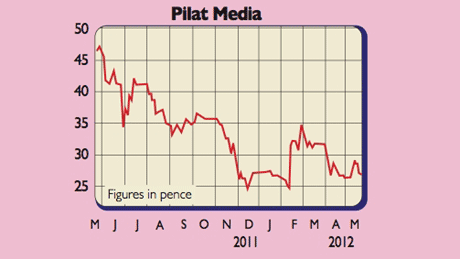Get the latest financial news, insights and expert analysis from our award-winning MoneyWeek team, to help you understand what really matters when it comes to your finances.
You are now subscribed
Your newsletter sign-up was successful
Want to add more newsletters?

Twice daily
MoneyWeek
Get the latest financial news, insights and expert analysis from our award-winning MoneyWeek team, to help you understand what really matters when it comes to your finances.

Four times a week
Look After My Bills
Sign up to our free money-saving newsletter, filled with the latest news and expert advice to help you find the best tips and deals for managing your bills. Start saving today!
When I was a child there were only three TV channels. Today there are thousands and their content is beamed across terrestrial, internet and mobile platforms.
That's why many broadcasters rely on Pilat Media's flagship Integrated Broadcast Management System (IBMS) to help them cope with the resulting media complexity. IBMS is one of the industry's most comprehensive software tools, allowing television stations to manage their advertising, scheduling, commercials, bookings and catch-up programmes.
Pilat's client roster contains around 60 blue-chips, including Sky, BBC World Service, Five, Virgin Media, AT&T, Discovery and CBS.
MoneyWeek
Subscribe to MoneyWeek today and get your first six magazine issues absolutely FREE

Sign up to Money Morning
Don't miss the latest investment and personal finances news, market analysis, plus money-saving tips with our free twice-daily newsletter
Don't miss the latest investment and personal finances news, market analysis, plus money-saving tips with our free twice-daily newsletter
The one notable exception is Rupert Murdoch's Fox Television. Fox was a customer until last year when it suddenly pulled the plug on the contract half way through implementation. Pilat settled out of court for a £544,000 payoff, but suffered a £2.3m one-off charge relating to unpaid debts. However, this looks like an aberration and did not stop Pilat from posting topline growth of 3% in 2011 (sales were £22.5m), thanks to strong ongoing maintenance fees.
Pilat Media (Aim: PGB)

Indeed, recurring revenues continue to grow steadily and are 26% of the total. There are also some attractive openings in central Europe and Australia. Net cash closed in December at a robust £6.7m and CEO Avi Engel recently highlighted that the order book already boasts around £17.5m of 2012's revenues.
As always, there are a few risks to consider. Being small, Pilat carries a higher level of risk than it would were it larger and more diversified. The industry is also characterised by lumpy orders. Once signed, these can suck in working capital as implementation tends to take a long time. Lastly, the media industry tends to be cyclical and another recession could put a brake on customer rollouts.
But given the ever-increasing consumer demand for digital content, the type of IT expenditure that helps Pilat should prove pretty resilient. What's more, there is an outside chance of a future bid from SintecMedia, which is a 24% shareholder and which failed in 2009 to acquire Pilat at 26.5p per share.
In terms of valuation, I would rate the stock on a ten-times EBITA multiple. Adjusting for the firm's cash produces an intrinsic value of about 50p per share. First-quarter results will be released shortly.
Get the latest financial news, insights and expert analysis from our award-winning MoneyWeek team, to help you understand what really matters when it comes to your finances.
Paul gained a degree in electrical engineering and went on to qualify as a chartered management accountant. He has extensive corporate finance and investment experience and is a member of the Securities Institute.
Over the past 16 years Paul has held top-level financial management and M&A roles for blue-chip companies such as O2, GKN and Unilever. He is now director of his own capital investment and consultancy firm, PMH Capital Limited.
Paul is an expert at analysing companies in new, fast-growing markets, and is an extremely shrewd stock-picker.
-
 Last chance to invest in VCTs? Here's what you need to know
Last chance to invest in VCTs? Here's what you need to knowInvestors have pumped millions more into Venture Capital Trusts (VCTS) so far this tax year, but time is running out to take advantage of tax perks from them.
-
 ISA quiz: How much do you know about the tax wrapper?
ISA quiz: How much do you know about the tax wrapper?Quiz One of the most efficient ways to keep your savings or investments free from tax is by putting them in an Individual Savings Account (ISA). How much do you know about ISAs?